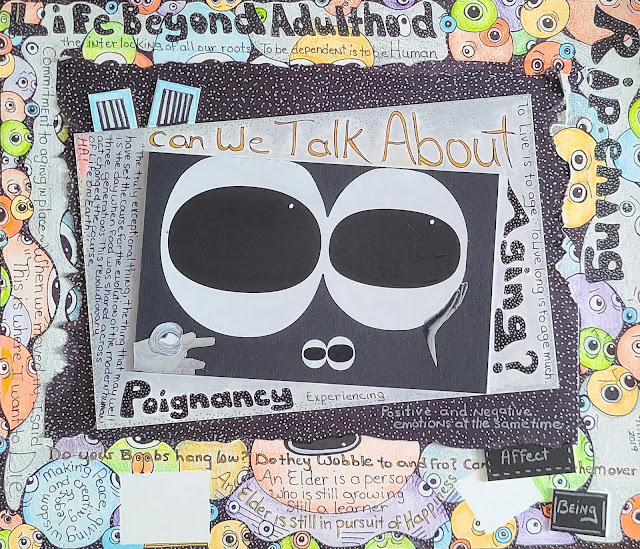Parkinson's: CBT Therapy
CBT Therapy?
I am 3 sessions into my CBT Therapy. What do I want from it, is still the
question I am asking myself.
•
I originally wanted it to help with my
sleep. But that is going pretty well
these days.
•
Also it was to help combat/control/squelch/lower
my normal level of anxiety. I have always been an anxious person. The Pandemic
didn't help, (me or anyone else.)
•
My major reason for wanting to do CBT therapy
was as a sort of preemptive strike for the uptick in anxiety that might come as
I go along the Parkinson's continuum. In
all the PD literature it talks about anxiety being a problem as well as
depression for people with Parkinson's. I wanted more tools to fight against
it.
Where have we gotten so far in the sessions? We are
getting to know each other. But each time, I don't know what to talk
about. I realized last time that I felt
anxious during the sessions. Which feels a bit odd and counter productive. I am
not sure why.
•
She has suggested I meditate before I go to bed
and when I get up. And suggested a “cord
cutting” meditation to use on you tube, that she likes. I tried it once, and
couldn't concentrate-found myself doodling, my eyes and hands gravitating
towards my colored pencils. I have tried to meditate for many years- It is a
very good tool to have in your wellness box, I know that, I have read books
about it, I have taken classes in it, participated in webinars about it, agree with it, but.....
•
She also suggested Journaling when I feel an
emotion to help figure out what triggered it.
•
We also talked about sitting with your emotions,
allow them to be and to flow through you. I'm not sure what that means in practice.
•
We talked about setting boundaries with
kindness.
•
And about being more assertive.
•
I have decided to finally use the CBT Toolbox
workbook by Jeff Riggenbach, PhD, LPC, that Steven got me years ago. It has questions to ask yourself and pages to
fill out. I think I need the extra
guidance.
I would like to become more aware of what I am thinking. Does that sound strange to you? Do you know what your thoughts are saying to you? The other night I listened to myself and realized that I was thinking negative things about my body. Not Parkinson's related more aging related.
Becky Baily begins by saying “self-control is mind control. It
is being aware of your own thoughts and feelings.” We are back to do you know what you are
thinking about?
“By having this awareness, you become the director of your
behavior. Lack of self control turns
your life over to people , events, and things as you careen through life on
remote control, either unconscious of your self or focused solely on what other
people are thinking and feeling.”
“Becoming aware of your own thoughts and feelings is a major
accomplishment, and the first step toward self-control.” “Most people don't have a clue to what they
are thinking.”
My hand is up. I don't have a clue.
Paying attention to your self always seemed selfish. But I
think it is what I need now to go forward.
The Power of Attention: What you focus on, you get
more of.
•
Pay attention to the many occasions when you
tell your self what not to do and what you don't want. Then consciously begin
to redirect your attention by focusing on what to do and what you do want.
•
When you are upset, you are always focused on
what you don't want.
The Power of Love:
See the best in one another.
•
Wish people well. Do this silently from your
heart, while you are driving,standing in lines, or passing people on the street. Notice how you feel when you do this.
•
Affirm to yourself, “What I offer to others, I
give to myself.”
The Power of
Acceptance: This moment is as it is.
•
Practice being present in each moment. Instead
of wearing yourself down with what you should have done or what you need to do
practice being where you are.
•
Practice being in the moment by noticing things.
Describe what you see to yourself. Make no judgments.
•
If you start to become upset when things are not
going the way you think they should, breathe deeply and affirm, “This moment is
as it is, and I can relax.”
The Power of Perception:
No one can make you angry without your permission.
•
Notice how your thinking creates your feelings,
if you are angry, sad or anxious, check
to see what you are thinking and where your mind is directed.
•
When you are upset say to your self, “I feel angry and it's okay. Or I feel anxious and it's okay.
The Power of Intention:
Conflict is an opportunity to teach.
•
Whenever conflict arises, breathe deeply and affirm, 'conflict is an opportunity to
teach and learn.
•
Ask your self “what is my intention in this
situation?”
•
Focus on responding to conflict rather than
trying to eliminate it. Ask your self
“Am I looking for blame or
solutions?” Blame attempts to prevent conflicts from happening. Solutions seek
to teach answers to future conflicts.
The Power of Free Will:
the only person you can make change is yourself.
•
Become aware of how often you think others are
making you do things.
•
Notice how often you use the words “should' and
“have to.” Change your “shoulds” to “coulds.” Then make a choice.
•
Practice
allowing others to have their own thoughts and feelings. Resist the urge to try and make
others happy or convince them you have all the answers.
The Power of Unity:
Focus on connecting instead of trying to be special.
•
In stressful situations ask yourself “Do I want
to be special, or do I want to connect with this person?” “Do I want to be
right or do I want to be happy?
•
Unity can arise from letting go of the need to
compare oneself to others, and choosing instead to connect through a sense of
equality. We all need to belong and to feel connected to something larger than
ourselves, and further to, to feel that we contribute to the well-being of that
whole. We want to feel valued and connected. The Power of Unity is about this
feeling that we are bound to one another, and, at the same time, have unique
contributions to make.
Nancy & the Snark



Comments
Post a Comment